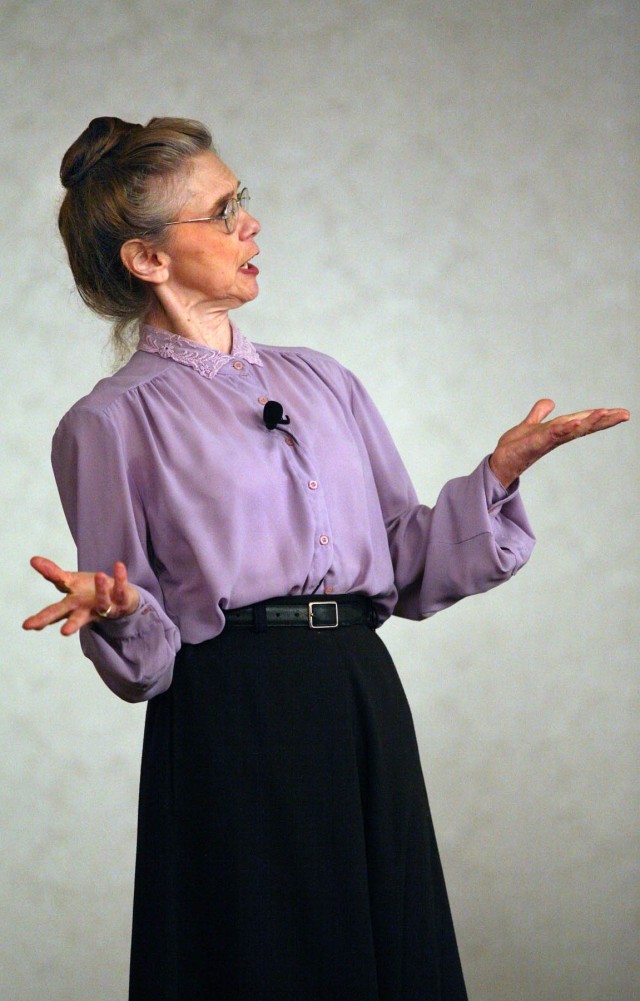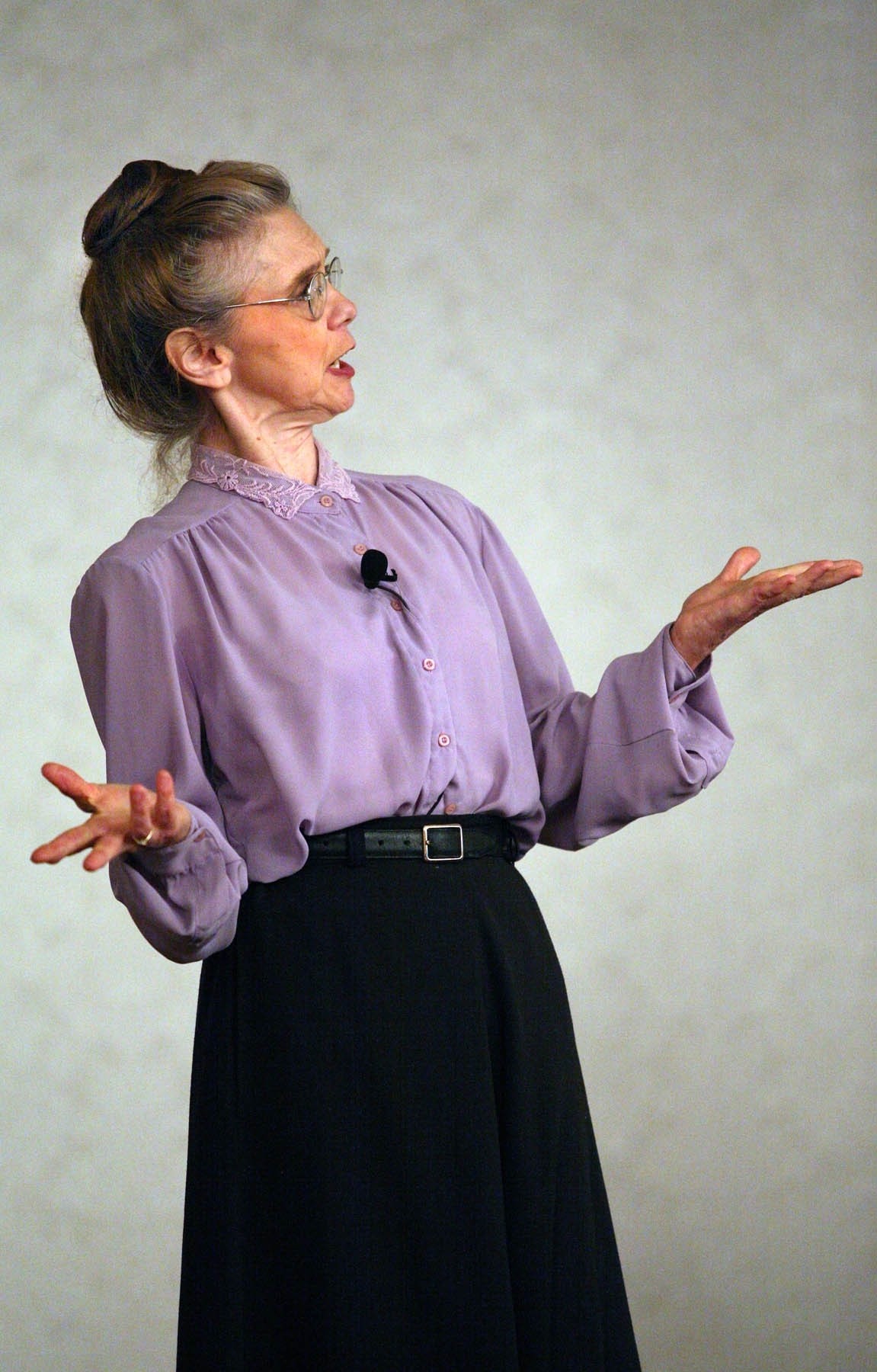
With a change in accent, hats and shawls, Barbara Callander took on the personas of several leaders of the women's suffrage movement in their relentless struggle to achieve the right to vote.
Callander performed "Marching Towards Equality" in observance of Women's Equality Day sponsored Aug. 19 at Club Meade by the installation's Equal Opportunity Office. The 90-minute program also included the National Anthem sung by Ciara Norman, a student at Old Mill High School in Millersville; a display of historic photographs; a documentary of the suffrage movement; and a celebratory cake.
"It was a great show, different," Deputy Installation Commander John Moeller said. "All the celebrations here are enjoyable, but to have a professional actress give us a little history, it's like living history, very entertaining."
During his welcome, Installation Commander Col. Daniel L. Thomas offered a more local perspective on the strides in women's equality. "I want to have you reflect a bit on our situation at Fort Meade and provide perspective on how far women have come," he said. "Part of it is you don't really think about it and it's a good thing, in a sense."
Thomas then listed names of women directors. "If you take away our female leadership, we would not run, period," he said. "So it shows the progress we made, where we are at and what we need to continue to do to protect that."
A professional actress residing in Silver Spring, Callander has performed women's history programs for the past 15 years, touring in Washington state with actress and playwright Toni Douglass in two plays about the suffrage movement, "May's Vote" and "Missed Liberties."
"We make history come alive," Callander said. "People say, 'I never knew history could be so interesting.' "
During her dramatic retelling, Callander presented the struggle for women's suffrage that culminated in 1920 with the ratification of the 19th Amendment. With her hair in a bun and dressed in a long skirt, lace-up boots and a lavender buttoned-up blouse, Callander read excerpts from plays and the diaries and letters by such prominent suffragettes as Elizabeth Cady Stanton, Susan B. Anthony, Lucy Stone and Stone's sister-in-law, Antoinette Brown Blackwell.
"Stanton was considered a great speech writer, while Anthony was a great organizer," Callander said.
The movement was influenced by Abigail Adams, said Callander. In a letter to her husband, she urged him to "remember the ladies, John" while hashing out the Constitution: "Do not put such unlimited power into the hands of the husbands. Remembers, all men will be tyrants if they could."
As Stanton, Callander outlined women's grievances at the Seneca Falls Convention, the first women's rights convention held in 1848 in upstate New York: "We are assembled to protest against a form of government existing without the consent of the governed ... to have such disgraceful laws as give man the power to chastise and imprison his wife, to take the wages which she earns, the property which she inherits, and, in case of separation, the children of her love; laws which make her the mere dependent on his bounty."
In a letter to Stanton, Anthony declared: "I shall never understand why simple equality is for woman an extreme demand."
As Anthony, Callander also laments to Stanton her frustration at turning 60 without having achieved suffrage, still unmarried, childless and alone for Christmas eating "spinster porridge."
Drawing on a satirical piece, Callander took on the role of Mrs. W. Winslow Crannell, an upper crust antisuffragette, who, before succumbing to "the vapors," rattled off a list of often-contradictory reasons why women should not get the vote.
"Women would not use it. If they had it, you could not drive them to the polls. ... If women were enfranchised, they would neglect their homes, desert their families, spend all their time at the polls. ... They would vote against their husbands, thus creating dissension, family quarrels and worse."
Women, she insisted, don't need to vote to get their way; nagging, is quite effective. "If that doesn't do, cry," she said. "Get what you want, make a scene, but do it in a womanly way. That is so much more dignified than walking up to a ballot box and dropping a piece of paper in."
Although early suffragette leaders died without reaching their goal, "they were brilliant in inspiring and training others," Callander said. "With each new suffrage state, more and more members of Congress had to answer to women back home."
By August 1920, only one more state was needed for the three-quarter majority required for ratification. As Febb Burn of east Tennessee, Callander read a letter to her son Harry Burn, encouraging the young Tennessee legislator to vote for ratification. "Don't forget to be a good boy and help AfaEURo I'll be wanting to see how you stood up."
Because of his swing vote, the 19th Amendment was signed into law on Aug. 26. But only one person who attended the Seneca Falls Convention was still alive, while many who had seen ratification hadn't even been born when the struggle began, Callander said.
Blackwell, who spoke at the 1850 National Women's Rights Convention, was also still alive. "She said, 'This is the happiest moment of my life. I know now, before I die, I will be able to go to the polls and vote,' " Callander said. "And she did" at age 95 in the 1920 presidential election.
After the event, many in the audience discussed the program. "I really enjoyed it," said Hope Woods, of the EEO for the Department of the Army at the Pentagon. "I really love how she portrayed it. The re-enactment gave us a better insight into the mind-set of women, and how strong and determined they were to have their vote heard. Overall, it was a great program."

Social Sharing